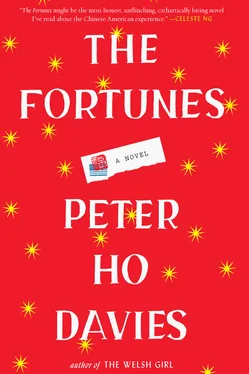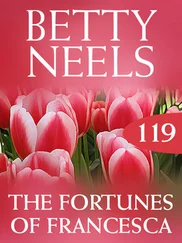Yin to his yang (if you want to fit it in a fortune cookie).
He’s a symbol now. His yearbook picture on T-shirts, posters, his name a rallying cry. And yet he can’t symbolize me. For him to mean what he means, he and I have to be different.
As the old joke goes:
Two Chinamen going down the street.
One of them walks into a club.
The other one ducks.
Not funny? Maybe it’s the way I tell ’em.
Yellow is what whites call us, of course, and mean it as a slur — skin color symbolizing character. But in fact Chinese started calling ourselves that first, way back around the time of the Opium Wars, to distinguish ourselves from white and black, when the connotations to us (the Yellow Emperor, the Yellow River) were positive.
We’d been sitting outside the McDonald’s on Woodward, perched on a raised planter made out of old railroad ties, our panting turning to laughter. We figured we’d lost them. “Your face when he pulled out that bat!” “I thought I was gonna shit myself, okay?” It was becoming a story. I could see us telling it at the wedding. I could see us joking about it for years to come. And it was just the two of us, something we’d always share. Evans and Pitts had ignored Jerry and Mike, after all. They only chased us. We sat shoulder to shoulder, sharing a smoke. In a minute I was going to suggest a Big Mac and fries (Vincent would likely counter with a Coney Dog from Red Hots up the block, another old haunt).
Saturday night, ten something, sidewalks still warm from the sun. Six lanes of traffic came and went in the intersection before us, exhaust rising redly in the taillights.
“First car in Detroit drove down this street,” he said.
“First mile of concrete paving in the country,” I recited from some high school field trip. “First assembly line rolled ’em out right over there.”
“Highland Park Hummingbird!” we chorused, nickname of the famous Chrysler starter motor.
He blew smoke out the side of his mouth. “My dad used to bring me down here to watch the cruising when I was a kid, teach me the names of all the marques. He could still remember the streetcars running. Now I can remember when it was all elms along here.”
The last time I’d seen him, I realized, was at his father’s funeral. His father, who’d moved to Detroit, like all our parents, because it was a boomtown.
“I don’t even want a Jap car,” he said. “It’d be like a Jew buying a Beamer!”
“Me either.”
“What would you drive if you could have any car?”
I actually wanted an Audi, but what I said was, “Trans Am.”
“Sally Fields in the passenger seat?” he teased. “You always loved them pony cars.”
“What about you?”
Cars were stopping in the intersection again, close enough to smell the hot metal breath of their engines.
“Porsche, man! Black 911 Turbo Carrera. What else?”
We were still laughing when they spotted us. “Sitting there and laughing,” Evans said in court. “It must have been real funny to them.” A joke at his expense, I guess he figured.
Or maybe we were just talking about girls? How fast they were. Their curves. Oil changes and joy rides. Headlights and trunks. I don’t remember.
I haven’t bought an American car in thirty years. I’ve never been to a baseball game. I have been back to a strip club once. The night after the final acquittal. This was in Cincinnati. Evans’s lawyers had successfully petitioned for a change of venue. It would be impossible to get a fair trial in Detroit after all the publicity about the case — interviews Lily had given, they argued, were “prejudicial”—even though publicity was the only reason the case had gotten reopened in the first place. At jury selection, I’d heard, fewer than 10 percent of possible Cincinnati jurors said they’d ever met an Asian American.
The place was called Sin City. Nicer than the Fancy Pants, it smelled of Windex and warm vinyl, a chemical new-car whiff, but I figured I could still get in trouble there. I was the one spoiling for a fight now, fantasizing about Evans and Pitts walking in to celebrate, tightening my grip on the neck of my beer, feeling the pulse in my fist. I watched the girls — one reminded me a little of Lacey — and I watched the men watching them. But no one seemed to notice me. The mood was mild — sappy, even. Worn, lonely men in rumpled sport coats, eyes wide and watery from drink, grinning like kids on Christmas. I wondered, could that have been Vincent if he’d lived? Lacey had said he was always smiling. By contrast, I was the one sourpuss in there, and the girls seemed to know to steer clear. If anyone was going to start something in there, it was going to be me, but I understood after a while I’d simply be too embarrassed to make a scene. The rowdiest it got was some joker waving his lighter in the air, shouting Freebird! until a bouncer shushed him primly, a finger to his lips. The crowd was mostly white, the bouncers all black, the girls a mix, even one Asian girl dancing to “Turning Japanese” (a euphemism for masturbation, so I’d heard, though it might have been BS). She came out like a geisha, mincing in a shiny kimono; by the end all she was wearing was white makeup and bright red lipstick. I found myself blushing for her, unable to watch except out of the corner of my eye, but then it came to me I was ashamed for myself, praying she wouldn’t see me, come over. Expose me.
She couldn’t have made me out in the gloom, I told myself. We men must have just been a constellation of cigarette tips from the stage.
Thirty minutes later she was back, this time in a thigh-length cheongsam and sleek black bob but dancing to the same song, I thought — both start with that cheesy Oriental riff just like “Kung Fu Fighting”—until I recognized Bowie’s “China Girl.” And then I did study her, her face, trying to decide.
Toward the end of the set, when she was naked, she met my eyes and I realized she’d known I was there all along, had seen me during her first set, or from backstage. Afterward she came up to me at the bar, wrapped in a short robe, nipples showing through like rivets. I shivered, reminded of how chilled the place was. “Don’t I know you, hun?” I swallowed my drink, shook my head, made to leave, but she put her hand on my arm. “What’s your name?”
“Vincent.” It just came out in my panic. I might have flinched, but if she noticed, it was only because she was used to people lying.
“Well, Vinny, I’m Cindy. Wanna buy me a drink?”
“Can I ask, are you Chinese or Japanese?”
“Whatever you want me to be, baby.”
“No, really. Tell me.”
“You wanna guess?” she asked, still teasing.
“No!”
“Okay, baby, okay.” She was calculating, I thought, trying to decide what I wanted to hear, even though I didn’t know myself. And something else — as reluctant to reveal herself as she’d be to tell me her real name.
I tried to imagine Vincent in my place: older, a little paunchy maybe, hairline receding. And suddenly I didn’t want her to have to lie.
“It’s fine,” I told her, finishing my drink. “It doesn’t matter.”
But she smiled, put a hand on my arm. “All-American, baby. We’re all American here.”
It felt like something to cover ourselves in, that word, its warm anonymity. And I nodded, sank back on my stool, bought her that drink.
Disorientation
The world is yours, as well as ours, but in the last analysis, it is yours. You young people, full of vigor and vitality, are in the bloom of life, like the sun at eight or nine in the morning… The world belongs to you. China’s future belongs to you.
Читать дальше












